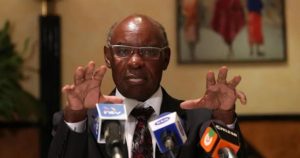Investigations
Kenya’s Silent Crisis: The Aviator Gambling Epidemic
“Aviator and other gambling systems are not just games, they are digital diseases,” said one anti-gambling advocate.

In Nairobi’s bustling informal settlements, a sinister crisis is unfolding behind mobile phone screens.
The deceptively simple game called Aviator—where players bet money on a virtual plane that climbs higher with increasing multipliers until it suddenly crashes—has evolved from casual entertainment into what health officials now describe as a “silent epidemic” devastating Kenyan families.
“I was supposed to be on a flight to Qatar for a real job opportunity,” says Dennis from Kiambu Ngegu. Instead, he lost Ksh 220,000 after placing a Ksh 1,000 bet that crashed at 1.00x odds. “I sold my woofer, my TV—everything went.”
This isn’t just about money lost. It’s about lives shattered.
The Perfect Storm
Aviator’s mechanics are deceptively simple: place a bet, watch a plane ascend, and cash out before it crashes.
The longer you wait, the higher your potential reward—but wait too long, and you lose everything.
What makes it so addictive? The game triggers the same neurological responses as other forms of addiction.
Ken Peter Munywa, a psychologist interviewed for this investigation, explains: “Many turn to gambling as a perceived solution to financial struggles. The hope is that through gambling, they can turn their lives around. But just like any addiction, things quickly get out of hand.”
A whistleblower from inside one of Kenya’s top betting companies revealed disturbing truths about how the game actually works:
“Most of the so-called winners you see with those big usernames staking large amounts and cashing out at perfect moments aren’t even real people. They’re bots designed to make the game look alive,” the source explained, speaking on condition of anonymity.
Even more concerning: “The whole thing is programmed to react to user behavior. The bigger your stake, the lower your chances of walking away with anything meaningful, because the system recalibrates based on your amount.”
Code Reveals Manipulation
Brian Osoro, a software developer who analyzed leaked code allegedly used in Aviator games, published findings that support these claims.
His April 2025 code review revealed that:
– The multiplier value determining players’ potential winnings is predetermined, not random
– This value appears inflated when few players are active to entice betting
– When many players are active, the multiplier is reduced to minimize payouts
– The game’s end point is controlled by administrators, not by chance
“The house decides when the game should stop as opposed to it being a random event,” Osoro concluded.
Lives Destroyed
The human cost is devastating.
A primary school teacher in Nakuru who began playing in 2023 lost her marriage, life savings, and mental health to escalating addiction.
After draining her salary and taking a Ksh 350,000 high-interest loan to chase losses, she even squandered Ksh 57,000 meant for the family’s planting season, lying to her husband that the money was “swapped.”
Her spouse eventually divorced her. She now lives alone in Nakuru, battling depression and withdrawal from society.
In another case, a young professional working at a village bank took Ksh 1.3 million from the safe, losing it all in just one week.
He was later discovered, taken to court, and his parents were forced to sell land to cover the debt.
The most tragic outcomes include suicide. One family shared screenshots of their brother’s final bets—Ksh 101,000 twice, then Ksh 68,000, and more in a single night, totaling nearly Ksh 900,000 before taking his own life.
“We buried him in our rural home in Baringo,” a family member said. “He was a graduate from Maasai Mara University with first-class honors.”
Media Complicity
As the crisis deepens, media organizations face growing accusations of complicity.
A whistleblower from a leading vernacular media station alleged that broadcasters earn 20% commission on losses incurred by their audiences after promoting gambling platforms.
Popular blogger Cyprian Nyakundi has specifically criticized media executives like SK Macharia of Royal Media Services: “Citizen TV broadcasts prime time advertisements for betting platforms and features alleged winners claiming fifty thousand shillings. It appears staged. SK Macharia, how much is enough? Young Kenyans are dying by suicide after losing everything to Aviator.”
The silence from media leaders and politicians suggests wider complicity in a crisis “affecting an entire generation,” Nyakundi asserted.
Public Health Crisis
The State Department for Public Health has begun addressing the issue.
Principal Secretary Mary Muthoni described online gambling as a significant threat to mental health and financial stability, particularly among youth betting with borrowed funds.
“We are deeply concerned about the escalating cases of gambling-related distress—from debt and depression to suicide,” Muthoni stated.
Proposed interventions include stricter regulations, awareness campaigns, and collaboration with media and telecommunications companies to limit promotion.
Meanwhile, the Association of Gaming Operators Kenya has called for responsible gaming, outlining age verification and self-exclusion tools while supporting the Gambling Control Bill to ensure safety.
More Than a Game
“Aviator and other gambling systems are not just games, they are digital diseases,” said one anti-gambling advocate.
“They spread far beyond the person holding the phone, and the real damage isn’t even visible on the betting screen. It’s hiding in kitchens where meals are skipped, in classrooms where school fees go unpaid, and in funeral WhatsApp groups.”
For those who have escaped the cycle, the lessons are clear.
“At least Mpesa can now retain funds,” said one former player who deactivated his betting accounts. “I don’t want quick money anymore.”
But for many Kenyans, these lessons have come at an unbearable cost.
As one relative of a victim put it: “This Aviator thing is a menace—a real menace!”
Kenya Insights allows guest blogging, if you want to be published on Kenya’s most authoritative and accurate blog, have an expose, news TIPS, story angles, human interest stories, drop us an email on [email protected] or via Telegram
-

 Grapevine1 week ago
Grapevine1 week agoAlleged Male Lover Claims His Life Is in Danger, Leaks Screenshots and Private Videos Linking SportPesa CEO Ronald Karauri
-

 Lifestyle2 weeks ago
Lifestyle2 weeks agoThe General’s Fall: From Barracks To Bankruptcy As Illness Ravages Karangi’s Memory And Empire
-

 Grapevine4 days ago
Grapevine4 days agoRussian Man’s Secret Sex Recordings Ignite Fury as Questions Mount Over Consent and Easy Pick-Ups in Nairobi
-

 Investigations2 weeks ago
Investigations2 weeks agoEpstein Files: Sultan bin Sulayem Bragged on His Closeness to President Uhuru Then His Firm DP World Controversially Won Port Construction in Kenya, Tanzania
-

 Business2 weeks ago
Business2 weeks agoKRA Can Now Tax Unexplained Bank Deposits
-

 Investigations1 week ago
Investigations1 week agoEpstein’s Girlfriend Ghislaine Maxwell Frequently Visited Kenya As Files Reveal Local Secret Links With The Underage Sex Trafficking Ring
-

 News1 week ago
News1 week agoState Agency Exposes Five Top Names Linked To Poor Building Approvals In Nairobi, Recommends Dismissal After City Hall Probe
-

 Investigations20 hours ago
Investigations20 hours agoMulti-Million Dollar Fraud: Three Kenyans Face US Extradition in Massive Cybercrime Conspiracy





























